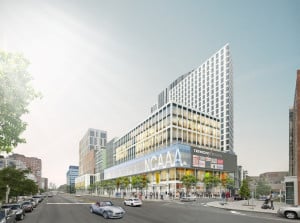
A relocated home for the Roxbury-based National Center of African-American Artists, BJ’s Wholesale Club and Planet Fitness were part of the Tremont Crossing project.
On a long-vacant parcel with a tortured history of failed development attempts, the $500 million Tremont Crossing project is set to reshape one of Roxbury’s main boulevards.
It’s the sort of mixed-use project that’s being built all over Boston, but the 1.2-million-square-foot development will have added significance in a neighborhood shunned by major private investment for decades.
Some 100,000 square feet of storefronts on Tremont Street will be set aside for local merchants, a newly-created agency will coordinate job training and continuing education programs to foster entrepreneurialism, and a relocated home for the Roxbury-based National Center of African-American Artists (NCAAA) will host art education programs, galleries for local artists and traveling exhibitions.
“There is a psychological and indeed a spiritual aspect to it,” said Edmund Barry Gaither, executive director of the NCAAA. “We’d like to see nightlife and other amenities come back to Roxbury, and grow in ways that create wealth.”
The Boston Planning and Development Agency (BPDA) gave its final approval to the 1.2-million-square-foot project this month. The development team hopes to break ground by next winter, pending construction financing and signing of a ground lease with the BPDA, Gaither said.
Known as Parcel P-3, the 7-acre site at Tremont and Whittier streets has sat vacant since the 1960s when buildings were demolished to form a right-of-way for the later-abandoned Southwest Expressway project.
Seeing real estate ventures as a potential income generator and source of financial stability, the NCAAA first sought designation as developer of the site during the administration former Mayor Raymond Flynn in the early 1990s. During the late Mayor Thomas Menino’s tenure, city and state officials placed a priority on luring a major office tenant to the site as an economic development catalyst.
A consolidated headquarters for Partners Healthcare was in the running, but rejected in favor of Somerville’s Assembly Row. So was a new headquarters for the state Department of Transportation, an option considered by former Gov. Deval Patrick but dropped following the election of Gov. Charlie Baker.
Bad market timing compounded the challenges for the NCAAA’s for-profit arm leading the development, Elma Lewis Partners LLC. An equity partner departed during the 2008 recession and plans continued to languish.
‘We’ll Crack The Code’
Enter Boston-based Feldco Development, a family-owned company which had built and operated over 100 shopping centers and office buildings throughout the Northeast over four decades.
John Palmieri, then the BRA’s executive director, encouraged Feldco executives to meet with Gaither who was in the process of interviewing potential new partners. The discussions stretched on for a year before the sides formed a 50-50 joint venture.
Feldco’s closely-held management structure played into its selection, Gaither said.
“The decision-making was compact,” he said. “We could actually make decisions about how to go forward very quickly. We expressed the concept and they were able to get on board with that. We didn’t do a lot of arm-twisting.”
Jeffrey Feldman, a vice president at Feldco, said he was attracted to the property’s proximity to Northeastern University, South End and the heavily-trafficked Ruggles MBTA station.
“There certainly were some challenges in terms of it being an untested real estate market,” he said. “There had been little new retail of any size built in Roxbury in many years. But it’s got all of the makings that you look for in a development site. When we saw this we said, ‘We’ll be able to make this work. We’ll crack the code.’”
Anxious not to miss another market cycle, the developers last year dropped a hotel from the project and delayed 109,000 square feet of office space until a future phase. Responding to public comments, they reduced building heights by 90 feet and added a new interior street that breaks the development up into four blocks.
“We have to move based upon the present and predictable economic engines that we have,” Gaither said. “It’s very much our hope the additional office space will fall into place.”
To comply with the city’s inclusionary development policy, 13 percent of the units would be reserved for households with incomes ranging from 60 percent to 80 percent of the area median income.
Approximately 75 percent of the retail space has signed leases or letters of intent, Feldman said. BJ’s Wholesale Club and Planet Fitness are the anchor tenants, but a quarter of the 462,000-square-foot retail segment will be reserved for neighborhood shops. And as part of the community benefits package approved by the BPDA, the developers will pay $125,000 a year to create an Office of Collaborations and Partnerships. The agency will coordinate job training programs for students and continuing education for adult community members with local schools and colleges to encourage neighborhood business creation.
“To make real these promises of economic development, we had to take the initiative to create an office and give it a function to foster collaboration,” Gaither said. “All of these entities are within an easy stroll, and they are all committed to job training opportunities and making a difference in Roxbury.”




 |
| 


